Demons are a reality. Scripture is replete with references to these spirit beings who are said to have rebelled against God and are now under the authority of Satan.[1] Although we’re never given a formal description, we’re told that demons, also known as unclean or evil spirits, can cause sickness[2] and violence,[3] perform false signs and wonders,[4] propagate deceitful doctrine,[5] and possess and oppress people.[6] In addition, we learn from Scripture that demons are aware of or are knowledgeable about certain people. For example, when the seven sons of a Jewish man named Sceva attempted to cast out an evil spirit, it responded by saying:
Acts 19:15-16 (NASB) …”I recognize Jesus, and I know about Paul, but who are you?” 16 And the man, in whom was the evil spirit, leaped on them and subdued all of them and overpowered them, so that they fled out of that house naked and wounded. (emphasis added)
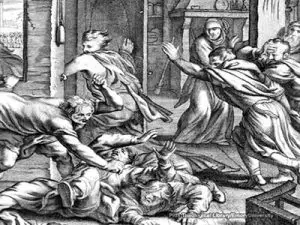
The word recognize in the Greek is ginôskô and it simply means: to come to know, recognize, perceive, understand.[7] In fact, the ESV, NKJV, NIV, and other mainstream translations each translate verse 15 as, “Jesus I know…” This leads us to the question, what exactly did they know? Who do demons believe Jesus is?
Who Do Demons Believe Jesus Is?
Who do demons believe Jesus is? In general, we are told that whenever Jesus encountered demons, they would identify him as the Son of God:
Mark 3:7-8, 11-12 (NASB) Jesus withdrew to the sea with His disciples; and a great multitude from Galilee followed; and also from Judea, 8 and from Jerusalem, and from Idumea, and beyond the Jordan, and the vicinity of Tyre and Sidon, a great number of people heard of all that He was doing and came to Him…11 Whenever the unclean spirits saw Him, they would fall down before Him and shout, “You are the Son of God!” 12 And He earnestly warned them not to tell who He was. (emphasis added)
Some interpret Son of God to be the equivalent of God the Son. However, the latter title is never used in Scripture. On the contrary, Son of God, when used of Jesus, is understood to be a title synonymous with Christ or Messiah, that is, the promised king of Israel:
Matthew 16:16 (NASB) Simon Peter answered, “You are the Christ, the Son of the living God.” (emphasis added)
Matthew 26:63 (NASB) But Jesus kept silent. And the high priest said to Him, “I adjure You by the living God, that You tell us whether You are the Christ, the Son of God.” (emphasis added)
John 1:49 (NASB) Nathanael answered Him, “Rabbi, You are the Son of God; You are the King of Israel.” (emphasis added)
Professor Douglas McCready explains that those in the first century did not understand the title Son of God to mean Jesus was God:
While some have used the title Son of God to denote Jesus’ deity, neither the Judaism nor the paganism of Jesus’ day understood the title in this way. Neither did the early church.” [8] (emphasis added)
Harper Collins Bible Dictionary also explains the meaning of the Son of God in early Christianity:
The use of the word “appointed” [with regard to the Son of God] in Romans 1:4 indicates that at this stage in the history of Christian thought, the title Son of God denoted an office or function in salvation history rather than a metaphysical quality as in later dogmatics. This usage is in accord with O.T. Jewish thinking.[9] (emphasis added)
Thus, unclean spirits understood Jesus to be the promised Messiah. But what about Jesus’ nature? As part of the spirit realm, these fallen angels[10] who rebelled against God would have known whether or not he was the second member of a supposed Trinity. Did they ever identify Jesus as God? The best way to answer this question is to examine their own words.
The Gerasene Demoniac
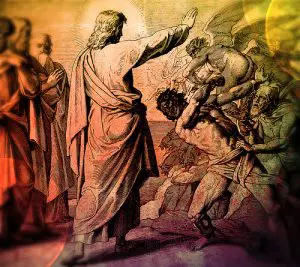
When Jesus came to the country of the Gerasenes,[11] he met a man with an unclean spirit who had been living among the tombs. The dramatic encounter is recorded in the synoptic gospels. How did the demon, whose name was “Legion; for we are many,” address Jesus:
Mark 5:6-9 (NASB) Seeing Jesus from a distance, he ran up and bowed down before Him; 7 and shouting with a loud voice, he *said, “What business do we have with each other, Jesus, Son of the Most High God? I implore You by God, do not torment me!” 8 For He had been saying to him, “Come out of the man, you unclean spirit!”[12] (emphasis added)
The demon declared Jesus to be the Son of the Most High God. By definition, there can be only one Most High God. Thus, the son of the Most High God cannot be the Most High God. Furthermore, the evil spirit implored Jesus by God, thus identifying God as someone other than Jesus.
Demon in Capernaum
The next example is just as specific as the first. When Jesus travelled to Capernaum, he taught in the local synagogue where there was a demon possessed man among the congregants. Listen to what he had to say about Jesus:
Luke 4:31-34 (NASB) And He came down to Capernaum, a city of Galilee, and He was teaching them on the Sabbath; 32 and they were amazed at His teaching, for His message was with authority. 33 In the synagogue there was a man possessed by the spirit of an unclean demon, and he cried out with a loud voice, 34 “Let us alone! What business do we have with each other, Jesus of Nazareth? Have You come to destroy us? I know who You are—the Holy One of God!”[13] (emphasis added)

The demon rather emphatically declared that he knew who Jesus was. He loudly cried out that the Nazarene was the Holy One of God. Not the One God who is holy, but the holy one who is of God. The word holy in the Greek is hagios and it means sacred, holy.[14] Thayer’s Greek Lexicon defines hagios in this passage as meaning that which has been “set apart” by or for God “to be, as it were, exclusively his.”[15] In other words, Jesus is not God, but the one who has been set apart by God for His plans and purposes. Indeed, Jesus is the promised Messiah. The demon, being a part of the spirit realm, knew this to be the case.
Jesus Silenced Demons
Earlier, we read in the gospel of Mark that Jesus warned the demons not to reveal his identity:
Mark 3:11-12 (NASB) Whenever the unclean spirits saw Him, they would fall down before Him and shout, “You are the Son of God!” 12 And He earnestly warned them not to tell who He was. (emphasis added)
In Luke’s parallel account[16] we read:
Luke 4:40-41 (NASB) While the sun was setting, all those who had any who were sick with various diseases brought them to Him; and laying His hands on each one of them, He was healing them. 41 Demons also were coming out of many, shouting, “You are the Son of God!” But rebuking them, He would not allow them to speak, because they knew Him to be the Christ. (emphasis added)
The demonic spirits knew Jesus to be the Son of God, that is, the Christ. Jesus’ refusal to allow them to speak underscores the fact that they could rightly identify him. Unclean spirits never identified Jesus as God, much less a second member of a triune God, a doctrine that would take an additional 350 years to fully develop.
Jesus’ Authority
Nevertheless, some will insist that the very fact that Jesus had authority over demons proves he is God. However, Jesus, himself, stated that his ability to banish unclean spirits was because of the Spirit of God:
Matthew 12:22-29 (NASB) Then a demon-possessed man who was blind and mute was brought to Jesus, and He healed him, so that the mute man spoke and saw. 23 All the crowds were amazed, and were saying, “This man cannot be the Son of David, can he?” 24 But when the Pharisees heard this, they said, “This man casts out demons only by Beelzebul the ruler of the demons.” 25 And knowing their thoughts Jesus said to them, “Any kingdom divided against itself is laid waste; and any city or house divided against itself will not stand. 26 “If Satan casts out Satan, he is divided against himself; how then will his kingdom stand? 27 “If I by Beelzebul cast out demons, by whom do your sons cast them out? For this reason they will be your judges. 28 “But if I cast out demons by the Spirit of God, then the kingdom of God has come upon you. (emphasis added)
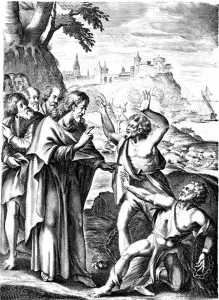 The crowds wondered if Jesus’ power over the demon signaled that he was the long awaited Son of David, that is, the Messiah. They certainly did not interpret Jesus’ power to mean that he was God. Luke describes this miracle-working power in his parallel account:
The crowds wondered if Jesus’ power over the demon signaled that he was the long awaited Son of David, that is, the Messiah. They certainly did not interpret Jesus’ power to mean that he was God. Luke describes this miracle-working power in his parallel account:
Luke 11:20 (NASB) “But if I cast out demons by the finger of God, then the kingdom of God has come upon you. (emphasis added)
Jesus’ power over demonic spirits was the result of the anointing and authority God had given him.[17]
Acts 10:38 (NASB) “You know of Jesus of Nazareth, how God anointed Him with the Holy Spirit and with power, and how He went about doing good and healing all who were oppressed by the devil, for God was with Him. (emphasis added)
Jesus had authority over demons, not because he is God, but because God was with him. What’s more, Jesus, in turn, delegated this authority to cast out demons to his disciples.[18]
Conclusion
Scripture records that the demons believed Jesus to be the man from Nazareth, the promised Messiah of the Most High God. They never identified him as deity. On the contrary, they understood, as did the Jews, that God is one:
James 2:19 (NASB) You believe that God is one. You do well; the demons also believe, and shudder. (emphasis added)
[1] Luke 11:18; Matthew 25:41; Ephesians 6:11-12; Revelation 12:9.
[2] Luke 8:2; 13:11; Acts 5:16.
[3] Luke 8:27; Mark 9:22; Acts 19:15-16.
[4] Revelation 16:14.
[5] 1 Timothy 4:1.
[6] Matthew 4:24; 8:16; 28; 33; 9:32; 12:22; 15:22; Mark 1:32; 5:15-18; Luke 8:36; Acts 8:7; 10:38.
[7] Strong’s Greek and Hebrew Dictionary, #1097.
[8] Douglas McCready, He Came Down from Heaven: The Preexistence of Christ and the Christian Faith, (Illinois: InterVarsity Press, 2005), p.56.
[9] Harper Collins Bible Dictionary, Paul J. Achtemeier, Editor, 1996 ed., p 1052.
[10] The term fallen angels is never used in Scripture, rather it stems from passages such as Luke 10:18 and Revelation 12:4 and 9, where Satan is cast out of heaven for his rebellion, along with a third of the “stars” (angels) that sided with him.
[11] The event took place near the city of Gergesa, thus in the country of the Gerasenes. The man is also referred to as the Gadarene demoniac which is named after the area’s largest city, Gadara. https://www.biblegateway.com/resources/dictionaries/dict_meaning.php?source=3&wid=S8128
[12] Luke’s account refers to Jesus as the “Son of the Most High God” while Matthew’s simply calls him the “Son of God.” (Luke 8:28; Matthew 8:28-29.)
[13] See also Mark 1:21-25.
[14] NASB Greek-Hebrew Dictionary, #40.
[15] Thayer’s Greek Lexicon, https://biblehub.com/greek/40.htm
[16] Luke 4:40-41 is associated with Luke 6:17-19 and Mark 3:7-12 in the Gospel Parallels (Thomas Nelson, 1967), p. 18-19, 53.
[17] Matthew 11:27; 28:18; John 13:3-4.
[18] Mark 3:14-15; 9:38; 16:17; Luke 10:1 and 17-20; Acts 16:16-18; 19:11-12.
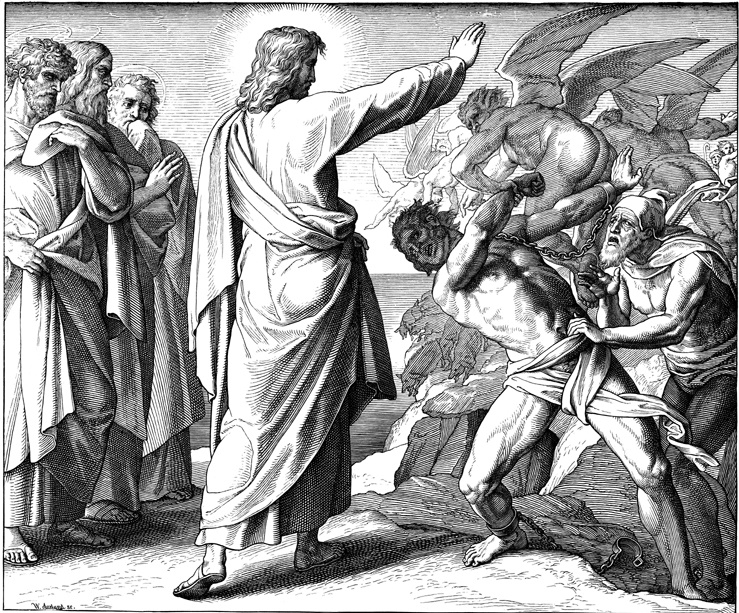
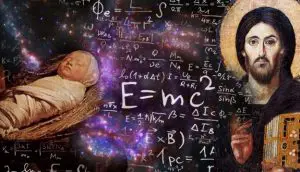


Many of the statements above are incorrect as the writers are apparently unfamiliar with the Holy Scriptures.
One example is Jesus IS THE SECOND OF THE TRINITY. The Jews knew what He meant when He said ” The Father and I are one”… only one of many different examples. That is why they tried to stone Him for blasphemy.
I don’t think some of these commentators are even Christian and has no business spewing their heresies. I have never commented on this site, but it is an excuse not to post my comment. Come on, be fair.
Thanks, Sussanne, for reaching out.
For centuries, the Jews were taught by God that He was one and that there were no other gods. When Jesus said I and the Father are one, they understood him to mean one in purpose, as the context of John 10 reveals. They never would have thought Jesus was declaring to be the second member of a Trinity since such teaching contradicted what they had been taught, and Jesus had never taught these things either. Indeed, the doctrine of Jesus’ deity and the Trinity is a post-Biblical development. You can read more about the evolution of the doctrine here. In addition, John Calvin, himself a Trinitarian, taught that Jesus’ statement that he was one with the Father meant they were one in purpose. You can find Calvin’s quote and an analysis of John 10:30 here. And now, in return, I am asking you to be fair. Please read the article.
”Then said the Jews unto him, Thou art not yet fifty years old, and hast thou seen Abraham? Jesus said unto them, Verily, verily, I say unto you, Before Abraham was, I am. Then took they up stones to cast at him: but Jesus hid himself, and went out of the temple, going through the midst of them, and so passed by.“
John 8:57-59 KJV
Jesus was God, manifest in the flesh. He is the Word of God!
”In the beginning was the Word, and the Word was with God, and the Word was God. The same was in the beginning with God. All things were made by him; and without him was not any thing made that was made. In him was life; and the life was the light of men. And the light shineth in darkness; and the darkness comprehended it not.“
John 1:1-5 KJV
Greetings Carlos!
Thanks for taking the time to comment.
I am familiar with the two supposed proof-texts you offer. Please take a few minutes to read my exposition of both passages. First century Jews and Christians did not view the texts through a Greek-philosophical lens as orthodoxy does today. It wasn’t until the third and fourth centuries that doctrine of the deity of Christ and the Trinity had fully developed.
I think you will find the following both very Biblical and very eye-opening:
John 1:1 The Jewish Mind vs The Translators’ Bias (Part 1)
John 1:1 The Jewish Mind vs The Translators’ Bias (Part 2)
John 1:1 The Jewish Mind vs Greek Philosophy (Part 3)
John 8:58 Before Abraham Was Born, I Am
Thanks again for reaching out!
OGW